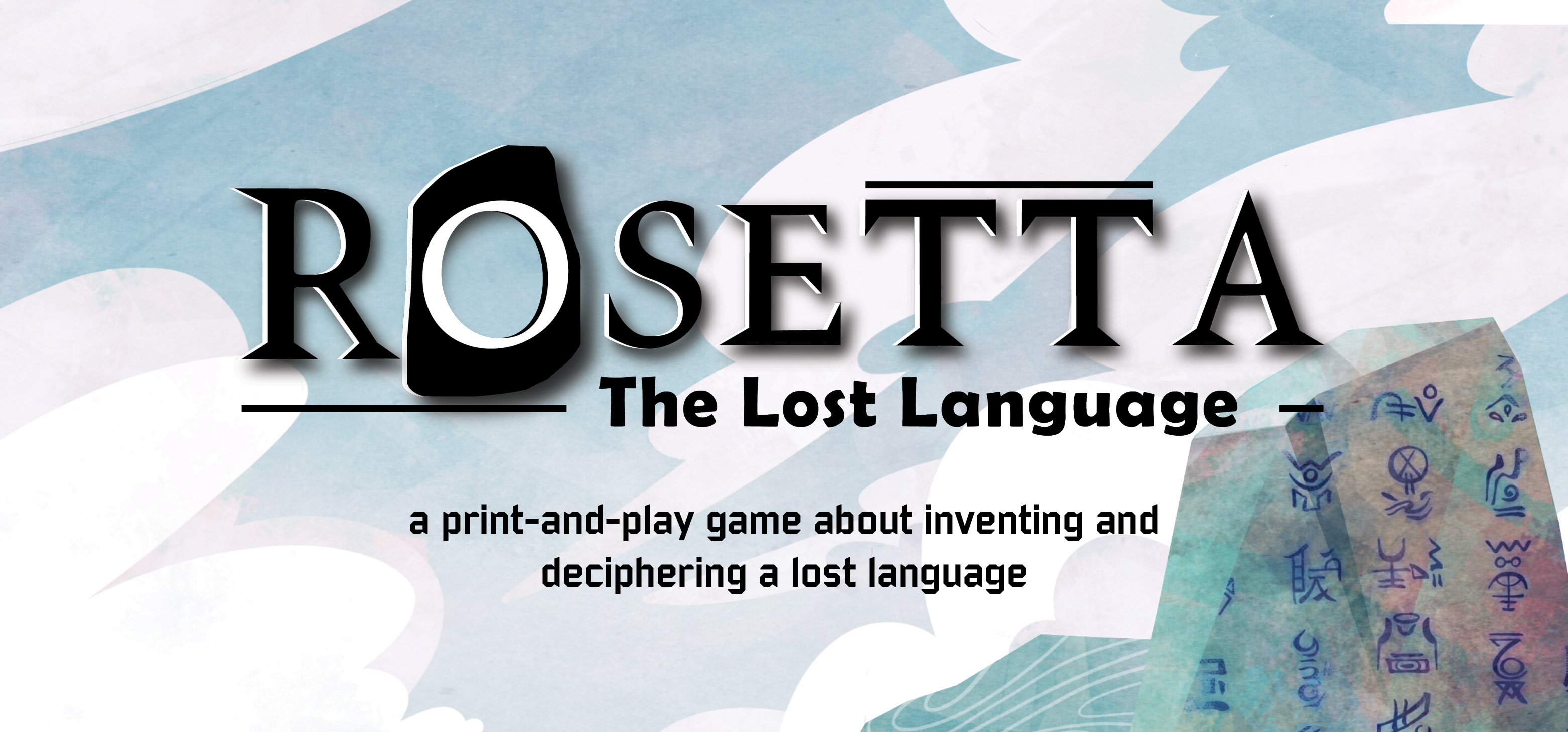From Here to There: Rosetta the Lost Language
From the designer:
I have been meaning to type this up for some time, so this is as good as any.
Rosetta: The Lost Language came into existence at the intersection of two points: a mild obsession with the Voynich Manuscript and a mild dissatisfaction with the language-solving elements of Heaven's Vault. I enjoyed the idea of authentically trying to understand a logogram or hieroglyphic, and as I grew up with a Japanese father and Chinese taught in my high school, pictorial and meaning-sound graphemes were linguistically familiar to me. I started, though, with writing systems, and rules around making up fake alphabets to be closer to the Voynich, and progressed from there. The development of Rosetta progressed in distinct stages:
A Different Kind of Author
The very first goal of the game, although it was always cooperative, was to guess the qualities or 'culture' of the author, or their identity or job. The author would draw cards that prompted a characterization, such as a social position or physical area (think fisherman + beach), which I immediately tested with index cards. It was not good, but the person who clearly had the most fun was the author, who afterwards would explain their creative choices. These choices made sense, although we had no tools to really explore them, so it was primarily a matter of bumbling around and doing nothing for fifteen minutes, then learning about this neat creative process one player had gone through. Often times we weren't even sure about the word itself that was relayed, and that ended up getting my attention.
Strange Scribbles
The new version then became concerned with decoding or transliterating. This meant the qualities of the author were discarded and replaced with limitations- like using certain limitations in writing style, or including certain elements. There were some cool playtests here, but the author needed to do a lot of fast creative work essentially inventing an alphabet. I thought this could be simplified by providing a sample word to translate, but that still required a lot of creativity from one person. That isn't a bad thing, but after some tests, essentially discovering an alphabet didn't give the feeling of 'archaeology' that I wanted.
Inscriptions Galore
I am a student of the Chinese language, and through my father, vaguely okay with Japanese. Chinese hanzi and Japanese kanji have a distinct representative element that reminded me of hieroglyphics, and something clicked. What if the limitation resembled what I had learned about pictographic and symbolic meanings in both languages? I switched the previous alphabet guessing element to a set of crappy symbols I whipped up on Photoshop and got to work. The Experts (which helped impart on the playtesters a feeling of authority), would guess a word and if it was right, they won, and if it was wrong, the Author would invent the symbolic glyph to translate, giving a chance to understand and transliterate the answer glyph more clearly. This immediately clicked and while I tested it at my place of work, co-workers would come into the room sometimes during lunch breaks and join in late, giving fresh perspective, which was a joy to discover as an element of play. You didn't have to be there at the start to enjoy it.
Abilities and Fragments
I wanted additional archaeological feelings, so quickly making some abilities that gave fun alternative clues was a clear move. It worked immediately, and folks wanted to use multiple per game, which made it instantly too easy. Players basically didn't care about gameplay until they had used the abilities, then began being strategic. The abilities were a fun crutch, so an arbitrary choice to choose between two early on (third round) worked immediately. However, one ability (the fragment), based on Chinese radicals, was the most popular and entertaining. Folks wanted it all the time, and nothing could beat how cool it felt. So, in a quick discussion, it came up that it could be in every game, but come later. This meant it served two purposes. Either players discovered it early on their own (feeling of accomplishment), or gave the Author a big bonus tool late in play to help a struggling group, so after round six fit best. It was like it was meant to be, and all the inscriptions were reprinted with an element highlighted, later moved to the corner, to facilitate this.
The Rest Was History
After that, and by that I mean over eighty rounds of playtests, the game sung. It was weird, it was unique, and it was focused. Feedback that felt more vulnerable or critical bumped up against how precisely 'itself' the whole game was, and we sent it off in its current form to a major convention to be tested alongside another, Archivist, which we had strong confidence in. We were shaky on Rosetta, but then in the wild it was what people wanted to play. Especially a turn to be the Author. It needed the right group, and it was thinky, for sure, but it was itself, almost to a point of fault, and it was hard to find ourselves wanting to change it further.
Files
Get Rosetta: The Lost Language
Rosetta: The Lost Language
A drawing game of creativity and intent.
| Status | Released |
| Category | Physical game |
| Author | mxjasperbeatrix |
| Genre | Card Game |
| Tags | Board Game, Drawing, Print & Play, Tabletop |

Leave a comment
Log in with itch.io to leave a comment.